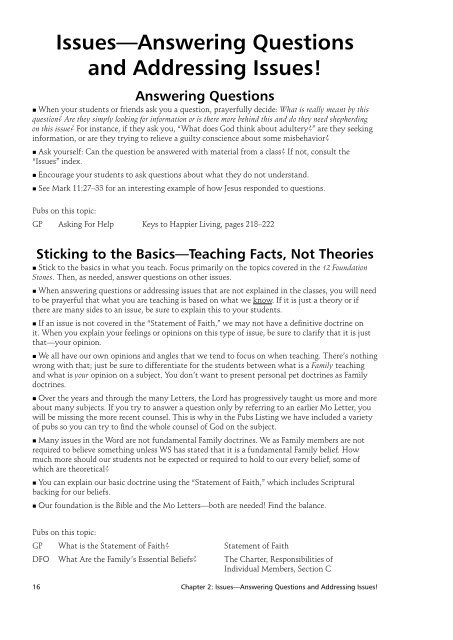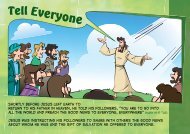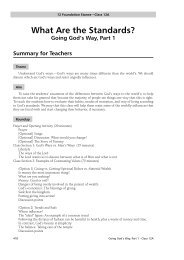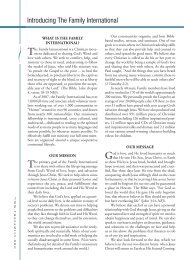12 Foundation Stones Course - TFI Online
12 Foundation Stones Course - TFI Online
12 Foundation Stones Course - TFI Online
Create successful ePaper yourself
Turn your PDF publications into a flip-book with our unique Google optimized e-Paper software.
Issues—Answering Questionsand Addressing Issues!Answering Questions When your students or friends ask you a question, prayerfully decide: What is really meant by thisquestion? Are they simply looking for information or is there more behind this and do they need shepherdingon this issue? For instance, if they ask you, “What does God think about adultery?” are they seekinginformation, or are they trying to relieve a guilty conscience about some misbehavior? Ask yourself: Can the question be answered with material from a class? If not, consult the“Issues” index. Encourage your students to ask questions about what they do not understand. See Mark 11:27–33 for an interesting example of how Jesus responded to questions.Pubs on this topic:GP Asking For Help Keys to Happier Living, pages 218–222Sticking to the Basics—Teaching Facts, Not Theories Stick to the basics in what you teach. Focus primarily on the topics covered in the <strong>12</strong> <strong>Foundation</strong><strong>Stones</strong>. Then, as needed, answer questions on other issues. When answering questions or addressing issues that are not explained in the classes, you will needto be prayerful that what you are teaching is based on what we know. If it is just a theory or ifthere are many sides to an issue, be sure to explain this to your students. If an issue is not covered in the “Statement of Faith,” we may not have a definitive doctrine onit. When you explain your feelings or opinions on this type of issue, be sure to clarify that it is justthat—your opinion. We all have our own opinions and angles that we tend to focus on when teaching. There’s nothingwrong with that; just be sure to differentiate for the students between what is a Family teachingand what is your opinion on a subject. You don’t want to present personal pet doctrines as Familydoctrines. Over the years and through the many Letters, the Lord has progressively taught us more and moreabout many subjects. If you try to answer a question only by referring to an earlier Mo Letter, youwill be missing the more recent counsel. This is why in the Pubs Listing we have included a varietyof pubs so you can try to find the whole counsel of God on the subject. Many issues in the Word are not fundamental Family doctrines. We as Family members are notrequired to believe something unless WS has stated that it is a fundamental Family belief. Howmuch more should our students not be expected or required to hold to our every belief, some ofwhich are theoretical? You can explain our basic doctrine using the “Statement of Faith,” which includes Scripturalbacking for our beliefs. Our foundation is the Bible and the Mo Letters—both are needed! Find the balance.Pubs on this topic:GP What is the Statement of Faith? Statement of FaithDFO What Are the Family’s Essential Beliefs? The Charter, Responsibilities ofIndividual Members, Section C16 Chapter 2: Issues—Answering Questions and Addressing Issues!
















